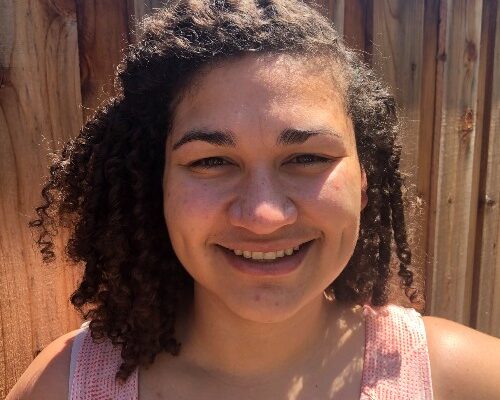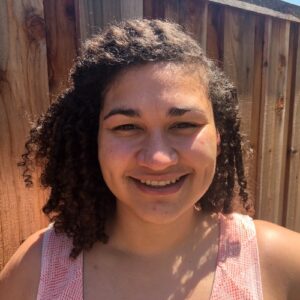
Emily King: Chasing the Wonder of Science from Sea to Land
March 2021
 This spring, we interviewed Emily King, PhD student in Integrative Biology at UC Berkeley. Emily has been volunteering with BASIS and as a Science Ambassador for the past three years and was selected as an Inspiration Honoree for the 200,000 Students Inspired Celebration in May 2021.
This spring, we interviewed Emily King, PhD student in Integrative Biology at UC Berkeley. Emily has been volunteering with BASIS and as a Science Ambassador for the past three years and was selected as an Inspiration Honoree for the 200,000 Students Inspired Celebration in May 2021.
What led you to pursue a PhD in Integrative Biology?
I study how aquatic animals deal with stress. I’ve always been interested in things that live in water, because I grew up in water all the time, swimming and going to the beach. I knew I wanted to study animals in the ocean. When I went to college I studied marine science, but I didn’t know what area of that very large field that I wanted to focus in. Eventually I learned about climate change; I learned about these other risks that animals are facing. I started to put together these cause and effect relationships, or to ask questions. “If this changes, what happens to this?” And eventually that led me to, “When the environment changes, how do animals respond?” That’s broadly the question I’ve been studying in my dissertation, “If this, then what.”
My interest in marine science has been fairly long. When I was a really young child, I watched the movie Free Willy for the first time. That was my real entrance into what I decided to think about later on. I watched the VHS so many times it broke. My parents had to buy a new one. Eventually I [asked], “How do I work with killer whales.” They [said] “That’s called a marine biologist.” That truly did set me on a path. I’ve refined that and changed direction– I don’t study whales– but I do still use that kind of inspiration.
Click to hear Emily’s inspiration in her own words.
Who do you hope to inspire in your work?
Learning to ask those questions, those “if then, what” questions, has been something that I’ve always encouraged my students to do. Sometimes, that’s about picking their own career. Sometimes it’s about whatever science that they’re learning at the time. Learning to ask those questions, “If I change this, then what happens?” can be really helpful for people. I think of those cause and effect relationships that’s happening in science but also with people.
Most recently, I was in the Science Ambassadors program, visiting the same kindergarten class a few times in a few months. That was the first experience with CRS where I got to see the same kids over and over again and to see how they held onto certain things. By the end, they remembered so many words! They were putting together these concepts. For such young kids, they really hold on to so much. That was exciting to see, and you could see they were talking to their family members off camera [to say] “Look! She showed us a snail!” There was a lot of feedback into, “Okay, maybe they’ll walk away from this still thinking about it.”
What brings you a sense of wonder in your work?
The best part of being a grad student is getting to answer questions that don’t have answers yet. You can always find out something more. It’s not something that somebody has told us that science is, that you have to find a book because maybe somebody already knows that–and maybe they do! That’s great, we can always add to that. A lot of what I do now is answering questions that there’s not an answer written down. I get to find out what the answer is and then I get to share it with people.
Describe a discovery you’ve made.
A lot of my dissertation is focused on a really tiny snail that’s originally from New Zealand. They’re spread all over the world, but they’re so, so small. Smaller than the tip of an eraser on a pencil. Once I started thinking about these animals, “How did they survive in a place not like New Zealand?” I started to think about what other tiny, little things are right under our feet or hiding in our neighborhood streams that we don’t think about because they’re so small. Getting interested in this tiny snail that can have a really big impact on its environment, I started meeting people who were also captivated by this idea. I was interviewed by the San Francisco Chronicle a few years ago by the reporter who was the spouse of someone I did community theater with. We started talking about what I did and he [said] “Actually, I’m a reporter for the Chronicle, can I interview you?” I didn’t think anyone at the community theater cared about what I was doing. So, there’s this interest in the things that we don’t think about in our daily lives that can spark these conversations and relationships that connect to lots of other people that we never thought we would meet.
Describe a goal you have.
The goal I have for my future career post PhD is a similar goal to what I hope to do as a member of the BASIS team and that’s [to] help people understand that they can be a scientist. They don’t have to look a certain way. They don’t have to have a specific background, everyone can learn science, and if that’s what you want to do, there are people who will help you do that. My future goals are really about helping, especially undergraduates, get their first research experiences, helping folks already involved in doing research decide if they want to keep doing that for a career or if they’d like to change their mind. I wanted to be that coach for people to [say] “If you want to do it, let’s talk about how to get there. It’s a process I’ve already gone through.” I love pointing people towards the things that they’re most excited about.
When I was in undergrad, I did one semester somewhere else. And I was looking around this community of scientists and nobody looked like me. That was a moment where I thought I could do it but [thought] “Wow, now I really want to do it! There’s no one here that looks like me.” For some people that can be really inspiring, “Hey look, there’s a space for me, I wouldn’t be the majority here, I probably have something to add.” For some people I know it feels daunting but I think as a community of people trying to add more seats to all of our tables, we’re hopefully drawing people in and students in the future are not going to look at the community and say “No one looks like me.” They should be able to find someone who’s like them–maybe it’s not looks, maybe it’s something else–but hopefully, we’re all finding some role models out there.